We Care About Your Privacy
By clicking “Accept all”, you agree to the storing of cookies on your device to enhance site navigation, analyze site usage, and assist in our marketing efforts. View our Privacy Policy.
The Learning Village provides targeted online and offline learning for 6-12 ('The Village') and 11-16 ('The Islands') year-old English language learners in schools where English is the language of instruction.
It focuses on three strands of learning:
The Learning Village offers EAL blended learning for learners in schools (for induction to English, gap filling and pre-teaching vocabulary and language structures) both for independent learning and small group teaching. Suitable for learners of any language due to its image-based methodology, including those not literate in their home language.
The impact of the Learning Village was tested in the following schools:
Longer term research has commenced in Lea Forest Academy, Birmingham and Wood End Academy, London.
Testing showed significant results.
You can find a document containing several case studies and testimonials demonstrating the impact of the Learning Village by clicking here.
You can find a case study of the impact of the Learning Village in Tudor Primary in London, UK, by clicking here.
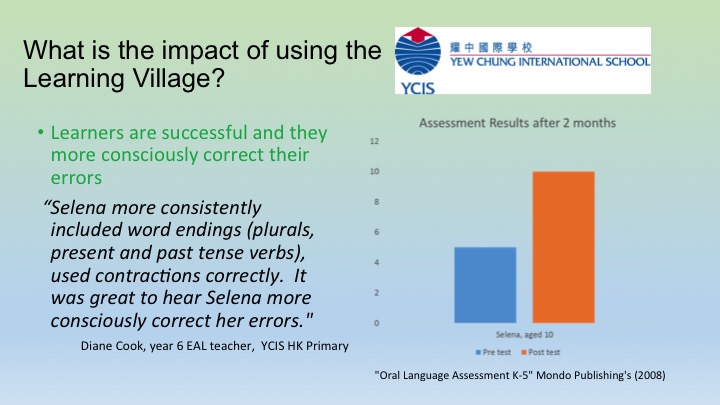
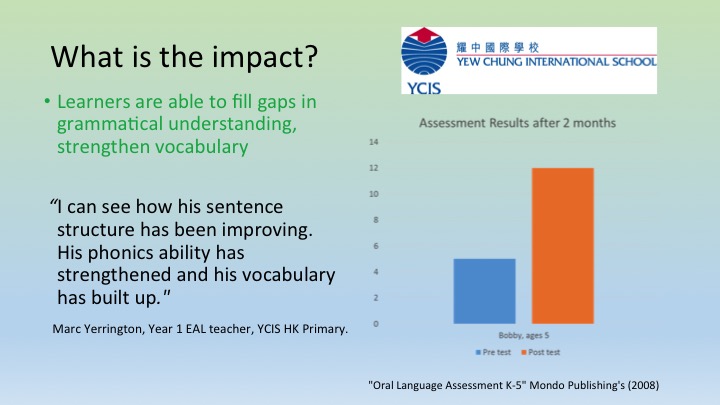
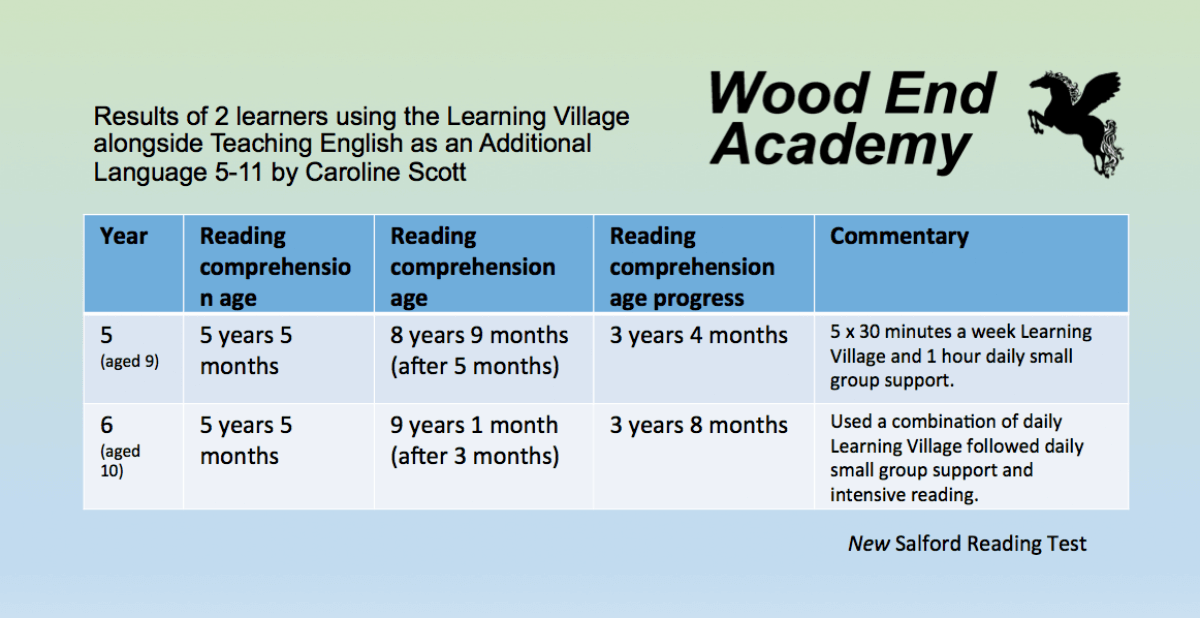
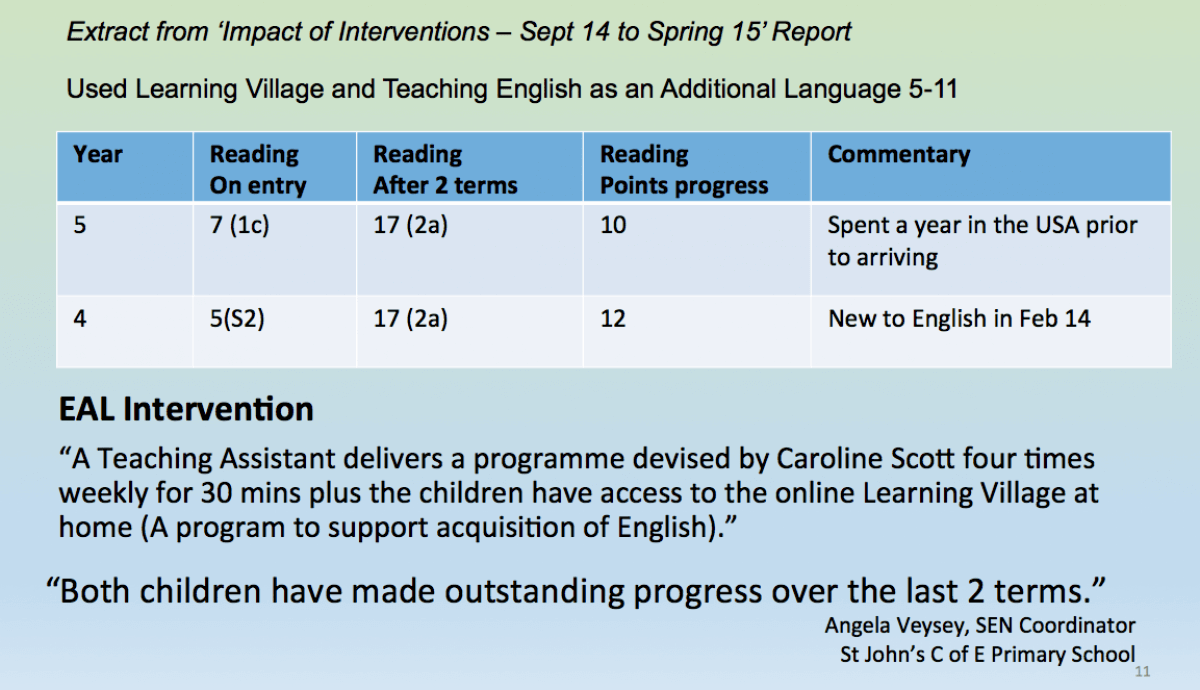
Download a PDF for student 'Ali' here (right-click then 'Save as').
The Learning Village is built on tested methods of learning and developed from Teaching English as an Additional Language 5-11 (2012) by Caroline Scott, Director.
It is based on a form-focus approach to learning vocabulary and language structures (through strategic use of flashcards online and offline) and is designed to be used in collaboration with communicative approach (immersion in the mainstream).
Research evidence supporting the strategic use of flashcards to learn vocabulary and language structures alongside a communicative approach to language learning is strong.
Nation and Waring point out:
Nation, P & Waring, R (1997) Vocabulary size, text coverage and word lists in Schmitt & McCarthy (1997) Vocabulary, Description, Acquisition and Pedagogy, Cambridge
Further methodology is published in 'An Engish as an Additional Language Programme: Learning through images for 7-12 year olds.' which will be released this year.
The learning of new vocabulary and language structures is taught through speaking, listening, reading and writing. It is delivered through pictures, making learning accessible to students of any mother tongue.
Teachers enroll their students, and can then monitor usage, view progress, assign curriculum content (lessons in all areas of the curriculum are available e.g. weather in Geography, Ancient Egypt in History, measurements in Maths and Sound in Science), request content and send messages to their students among other features.
There are over 10,000 words/phrases that have been designed to be aligned to the National Curriculum, the International Primary Curriculum, Cornerstones Curriculum, International Baccalaureate PYP and any other curricula.
Flashcards come with every lesson as well as games to support usage.
Lessons are split among three strands of learning:
The Learning Village is designed to allow students to take ownership over their language-learning journey with a private website login. At the heart of the student experience is the Learning Village map, which closely mimics the student’s move to a new town in 'The Village' and islands in 'The Islands'. A tree-house in 'The Village' and the cafe' in 'The Islands', the student’s private quarters within the map, displays the aforementioned three strands of learning and provides a journey-like experience for each. As students progress through their strand-journeys, friends are made and populate their map. Friends can be visited at any time and facilitate the writing and speaking elements of the learning journeys. They also support the student with motivational messages.
Learning Village comparison guidelines
This information will be useful to anyone using the Learning Village in collaboration with other assessments e.g frameworks such as Common European Framework (CEFR), NASSEA, Language in Common and the new English National Curriculum Proficiency in English or tests such as the New Salford Reading Test or old QCA National curriculum level tests.
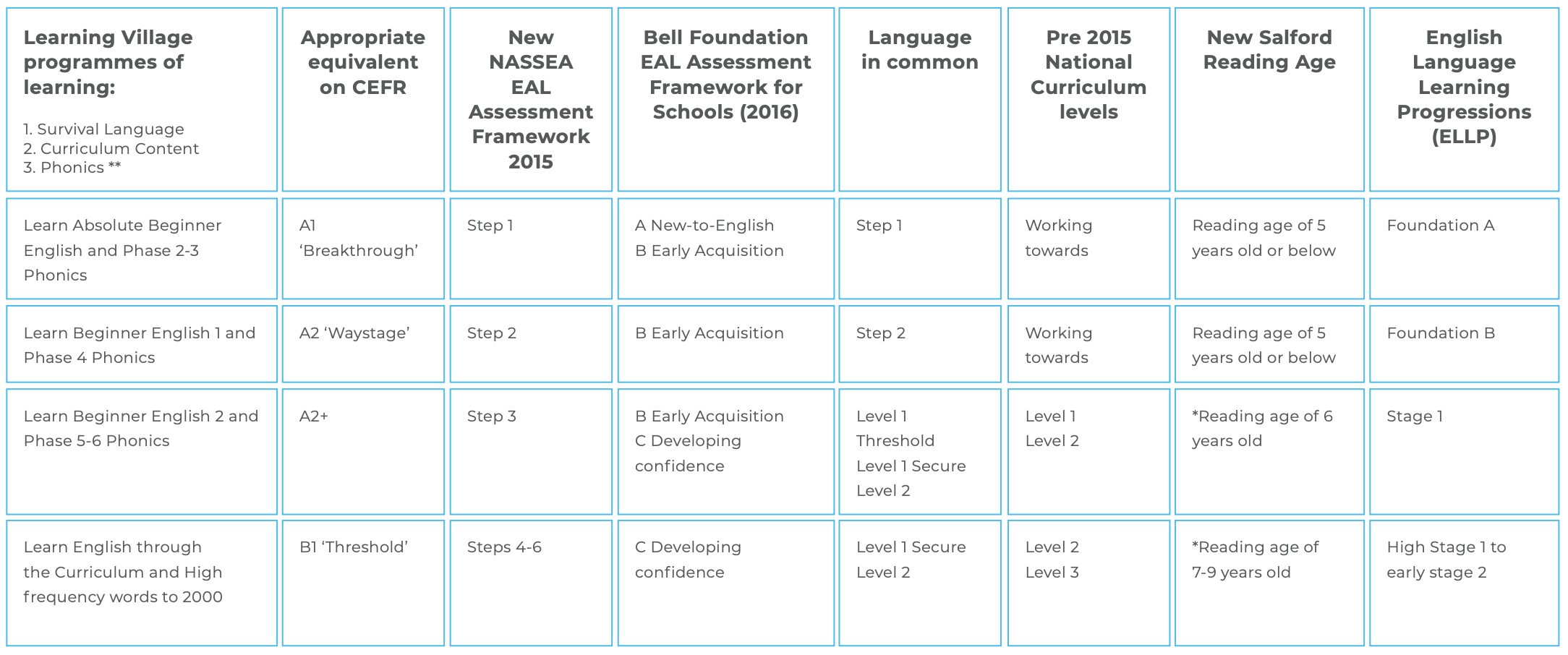
*Note that a reading age may be over 7 years old but vocabulary and language structures may not be secure. If you believe this to be the case, assess learners on the content of the sessions using the hide button on the ‘learn pages’ of the demo learner. You can then note down your findings using the assessment for learning grid for tracking survival language (found in your toolbox).
**Phonics is based on Letters & Sounds (Department for Education & Skills), high frequency words (New General Service List) and New National Curriculum.
You can read more about how the Learning Village can help learners with SEND needs in our SEND booklet and on our SEND page.
The Learning Village has been developed based on the needs of teachers in schools in the UK and internationally. Lessons are developed from the New English National Curriculum, the International Primary Curriculum, International Baccalaureate and other curricula.
Simply choose the curriculum topic you are studying and source it on the Learning Village for your students to learn. All lessons are built on assessment and include sections on:
All online lessons come wth flashcards to that can be used offline.
Please see the pricing here: Pricing
Here is an example: 1 primary learner (if you buy 15) = £44 per learner
If a learner spends 30mins x 5 times a week for 12 months each = 120 hours tuition for £44 per learner
(total hours tuition available exceeds this)
It's also fully customised to suit your learner! How much would it cost a member of staff to provide this much tuition?
In addition to this you receive:
An EAL support programme, demo student for whole group teaching, monitoring of progress reports and flashcards to support every lesson.
Go here and enter the email address you registered with. You will be sent an email with the username visible:
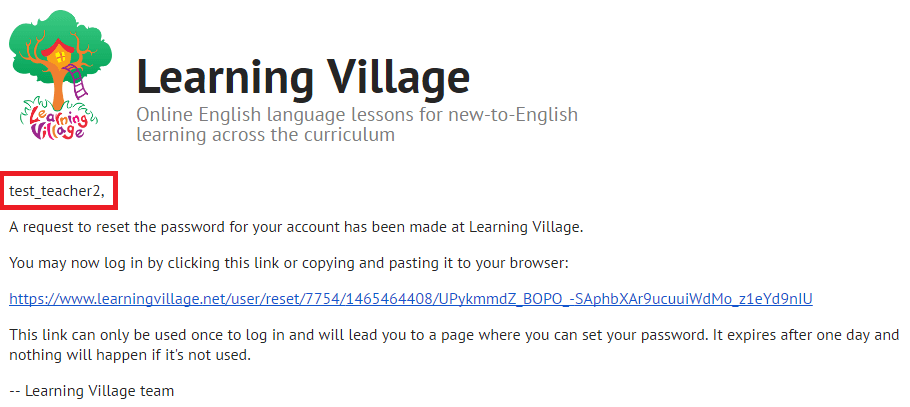
You can then click on the link to log in without a password.
Once logged in you should update your password by clicking here:
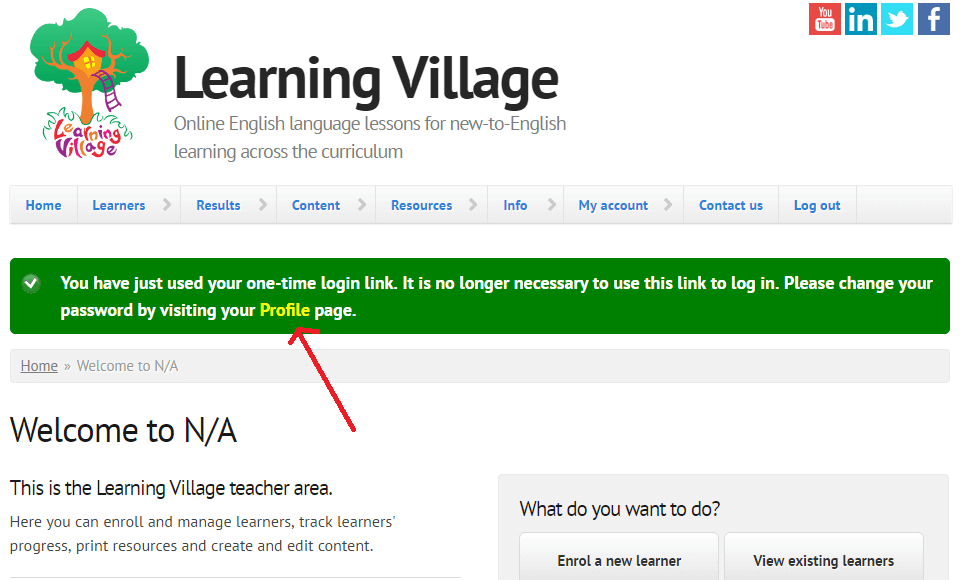
At which point you'll be taken to your profile page where you can change your password:
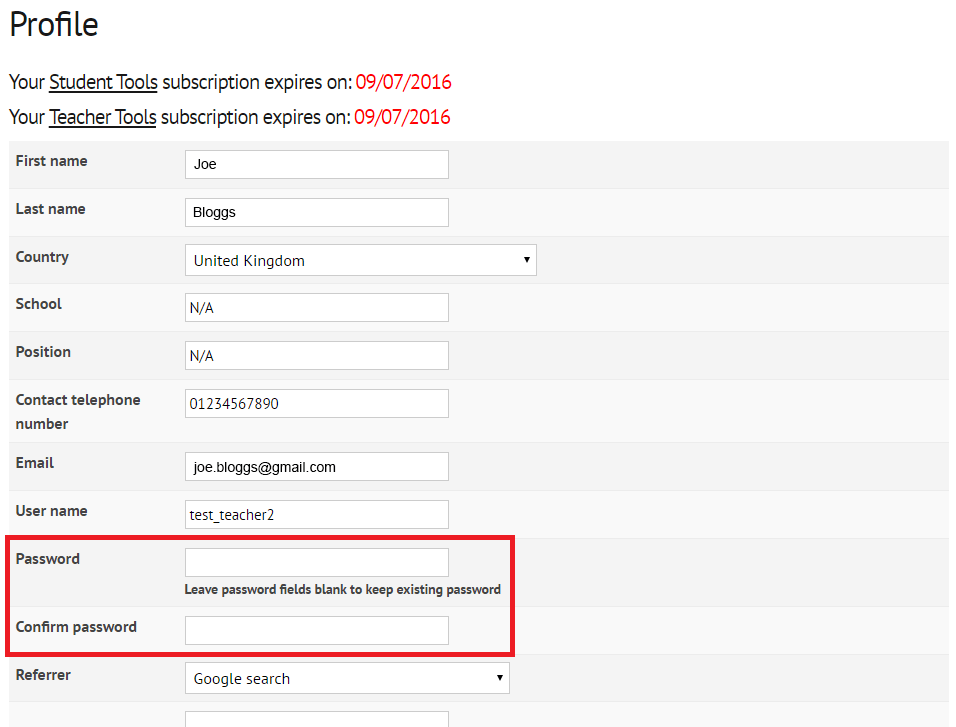
The Learning Village is resource developed by Across Cultures. We provide teachers and parents with the skills and resources needed to successfully support their young English language learners within the demands of the curriculum. You can find out more about us on this page.
Caroline Scott, Author and Director at Across Cultures originally began writing an induction to English, funded by the Local Authority of Tower Hamlets in 2002.
This funding was awarded to accommodate the distinct need for additional support for new-to-English learners in the mainstream. After writing her first draft, Caroline went on to develop this further, eventually providing training for many schools in Tower Hamlets and beyond. After some years, Caroline left Tower Hamlets to start an international School overseas. There, she was able to develop ideas further. Following significant additional research, she wrote her first book, 'Teaching Children as an Additional Language: A Programme for 7-11 year olds'. She later went onto write her second book, 'Teaching English as an Additional Language 5-11, A Whole School Resource', which encompassed many more facets of language learning, including language learning strategies, additional assessment and differentiating further for all levels of language across all curriculum subjects.
The Learning Village was a natural evolution of her work. It allows increased flexibility for learners and teachers, as well as significantly more content and assessment opportunities. Caroline also delivers a three-day training for senior teachers/leaders on supporting EAL learning across the curriculum (the EAL Framework course), as well as whole-school insets and one-day courses on how to achieve effective EAL teaching through the Learning Village.